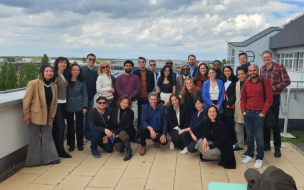At no point in history has so much data been available. Between 2019 and 2020, the amount of user-generated data available worldwide increased 1000% to 44 Zettabytes—that’s 44 trillion gigabytes!
The boom is defining a new era in business: harnessing the wealth of information available is a feature of business models across a range of industries, and it’s even creating entirely new jobs.
So what job opportunities are available to you in this data-driven era? We spoke with Etienne Denis, director of the MSc in Marketing Analytics at EDHEC Business School which is scheduled to launch this year, to identify three cutting-edge jobs of the future and learn how to land them.
Three jobs of the future
Neuro A/B Tester
Broadly speaking, A/B testing—or split testing—refers to two versions of something being shown to consumers at the same time to identify which is more effective. It’s a common marketing tactic, heavily reliant on the ability to collect and analyse data.
But Neuro A/B testing involves something more: “the neuro element relates to expertise in terms of consumer psychology,” Etienne explains. “The idea is really to be able to understand how people think or process information.”
A Neuro A/B Tester would be skilled in collecting and analysing consumer data, and would have a strong psychological understanding of consumer behaviour that would help their analysis.
“We can’t just blindly deal with data without taking this human aspect into consideration,” says Etienne. “By itself it means nothing if you don’t consider the psychology of people.”
Algorithm Bias Auditor
By nature, humans are inherently biased: influenced by our surroundings, our understanding of the world, and our opinions. We may think that technology, and more specifically Artificial Intelligence (AI), is free of our flaws; but unfortunately algorithms and code are layered with the biases of those who wrote them.
That bias grows more impactful as AI evolves within our society. Currently, 37% of businesses employ AI for various reasons, a number that’s only likely to grow in future.
Resolving this issue requires a new kind of specialist role aimed at identifying and removing underlying algorithm bias. Enter: the Algorithm Bias Auditor, a job involving psychological expertise and an understanding of data and analytical skills.
“We're moving towards that direction of a data driven way of thinking,” says Etienne. “We're just adapting to the evolution of that current path.”
Machine & People Ethics Manager
Combining a wealth of consumer information with strategies that utilize advanced consumer psychology to achieve business goals poses a number of issues. Consumer privacy is a large area of concern.
“We really believe that information is power, it comes with responsibilities. If we can deal with huge amounts of consumer data we have to know what we can and can’t do,” Etienne explains.
With ethical data usage already an issue, as data further evolves specialist roles will be needed to maintain the right balance. A Machine & People Ethics Manager ensures the relationship between algorithms and the people whose data they target is ethically sound. They aim to help businesses achieve their aims by implementing innovative but un-intrusive campaigns and strategies.
“Even if an action is within the limits of what they can do, they also have to make the appropriate choice for customers,” explains Etienne.
How to land a career of the future?
So how can you secure one of these innovative jobs of the future? Well, at their core, each deals with the relationship between a data-driven society and the consumers providing that data.
A keen understanding of data and a broad range of analytical skills would prepare you on one hand, but an understanding of consumer psychology is equally essential.
Applicants to the upcoming MSc in Marketing Analytics at EDHEC tend to fit within two profiles, Etienne says. Those who know how to deal with consumers but lack a data driven way of thinking; and those who are comfortable with data but lack the understanding to make consumer-led analysis.
The course will therefore focus on merging the two. There are core modules covering consumer psychology, customer management and behavioural analysis; along with data visualisation and coding.
There’s also further opportunity to specialize during elective modules in subjects like AI, digital transformation, and behavioural sciences.
“Bit by bit, I would say a data-driven approach will become the standard approach in future,” Etienne says. “It’s really good to have a balance between being data-driven and being human or psychology-driven.
“People aren’t fully rational,” he adds. “We know they’re highly emotional, they take shortcuts, and they don’t always prefer information the way we think they will or should. Taking that into account really makes the data alive.
“The point of our new MSc is that we have to provide students with the tools they need to adapt to this new philosophy.”








